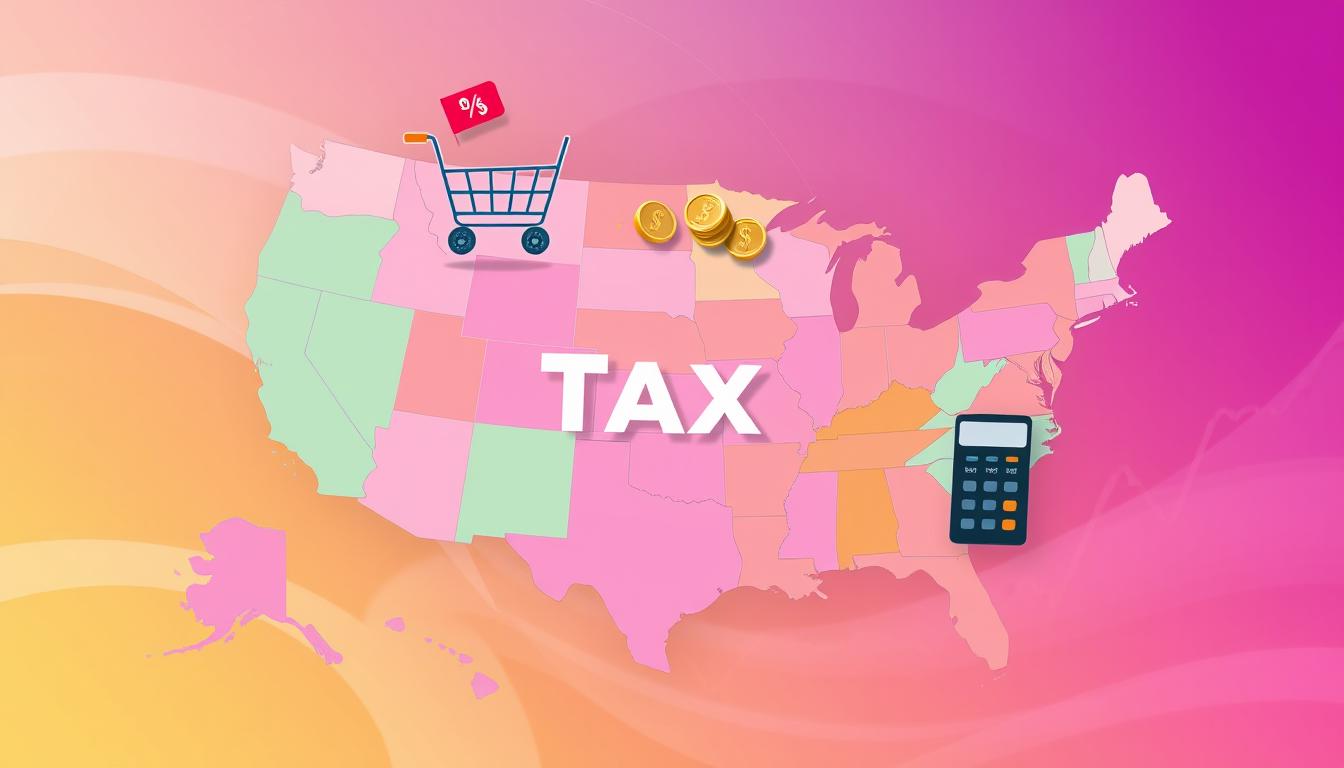Did you know 46 states in the US handle their own sales tax? This tax is usually a percentage of the product’s price charged at the sale point. It’s vital for supporting state and local programs1. As you learn about taxes in the USA, it’s key to grasp how sales tax operates, its state variations, exemptions, and effects on both locals and visitors. This piece will break down US sales tax basics, making you savvy for your shopping trips.
Key Takeaways
- Sales tax is essential for funding state and local services.
- Different states have varying rates and rules regarding sales tax.
- Some states offer tax-free shopping programs for international visitors.
- Sales tax calculations involve multiplying the purchase price by the tax rate.
- Exemptions for certain items and services may apply.
- Understanding sales tax helps you make informed purchasing decisions.
What is Sales Tax?
Sales tax plays a big role in the American economy, affecting both shoppers and companies. It’s important to know what sales tax is, why it exists, and its different types. This knowledge is key for handling your money well, whether for personal use or in business.
Definition and Purpose
Sales tax is a tax on the purchase of goods and services, set by state and local governments. It helps pay for vital services like schools, healthcare, and roads. The main goal of sales tax is to fund things that help everyone in the community.
Types of Sales Tax
There are several kinds of sales tax, depending on where you are and what you’re buying. Some common ones are:
- General Sales Tax: This applies to most things you buy.
- Use Tax: For items bought in a state without sales tax.
- Special Sales Taxes: Aimed at certain items like luxury goods or cigarettes.
In California, sales tax rules can change depending on certain situations. For example, if you buy something but don’t ship it out of the state right away, that purchase might be taxable. However, there are exceptions like when a retailer directly ships goods abroad or meets certain export conditions. Understanding these rules can make buying things less confusing2.
There are also times when you won’t have to pay sales tax. For instance, foreign missions in the U.S. can get tax exemption cards for their shopping. These cards have different exemption levels and don’t cover all types of purchases3.
Every state has its own sales tax laws. Take New York, where there’s sales tax on hotel stays and some local areas add extra taxes4.
Sales Tax Varies by State
In the United States, sales tax differs from one state to another. Each state sets its own sales tax rates. This can include local taxes that add more to the total rate. For example, most U.S. states have their own sales tax, except for a few like New Hampshire, Oregon, Montana, Arkansas, and Delaware5. Local governments can add their own sales taxes. This increases what people must pay5.
Overview of State Sales Tax Rates
State taxes are important for budgets of consumers and businesses. In California, the base sales tax is 7.25%. But local taxes can raise this amount. On the other hand, some states have low or no sales tax. This makes them good for shopping and business. Twelve states use origin-based rules for sales tax. Most others, including Washington, D.C., use destination-based rules6.
States with No Sales Tax
If you want to save money, know which states don’t have sales tax. Alaska, Delaware, Montana, New Hampshire, and Oregon have no general state sales tax. This can make a big difference in buying decisions. It’s important for personal finance5. Businesses also face challenges with online sales and recent legal changes. Understanding these sales tax rules is key for companies across the country5.
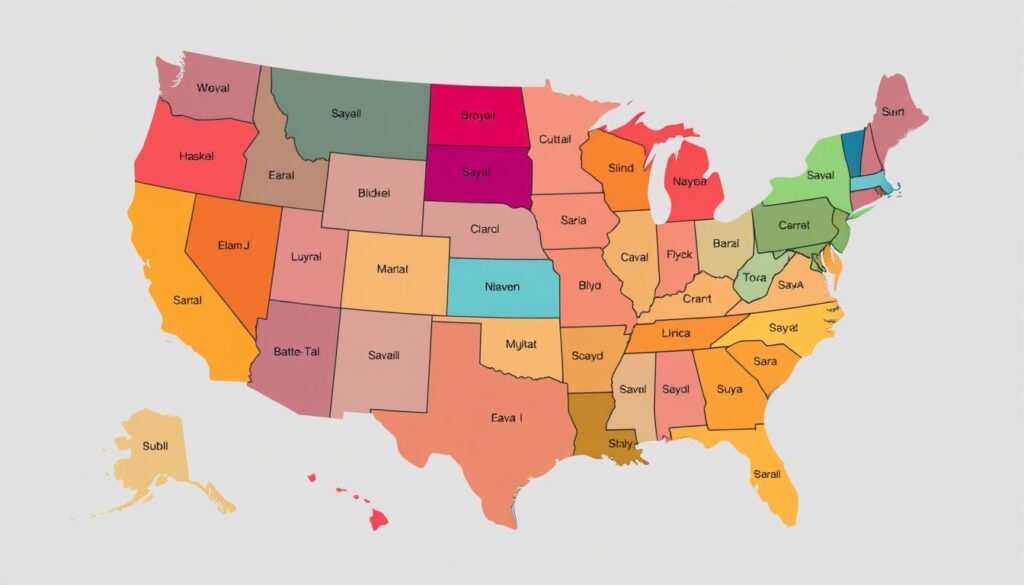
How is Sales Tax Calculated?
Learning to calculate sales tax is key for shoppers and businesses alike. It’s figured by applying the tax rate to the price of goods or services. The rates can change a lot, based on your local or state laws.
Basic Calculation Methods
The simple way to figure out sales tax is to multiply the price by the tax rate. For example, buying something for $100 in Florida, with a 6% tax rate, means you pay $106 total7. You’ll often find various ways to calculate sales tax since some places have a set rate and others add extra local taxes8.
Examples of Sales Tax Calculation
Let’s look at some sales tax examples. Buying $50 shoes in California, with a 7.25% tax, your total is $53.639. Or, a $500 appliance in a state with a 6.5% tax rate will cost you $532.50. Note that sales tax might also apply to certain services and items, following state rules8.

Understanding Nexus in Sales Tax
Nexus is core in figuring out if a business must collect sales tax. Knowing nexus saves you from surprise tax bills. It’s key to know how physical and economic nexus impact you.
Definition of Nexus
For tax purposes, nexus is the link between your business and a state. If there’s a big presence in a state, sales tax collection is likely needed. This includes offices, workers, or property in the state.
Types of Nexus: Physical and Economic
Physical nexus means you have a real presence in a state. Having a place, workers, or stock means you need to collect taxes. Economic nexus came into the spotlight with the South Dakota v. Wayfair case. It depends on your sales within a state, not location. States have thresholds, usually $100,000 in sales or 200 transactions10.
Different nexus types have grown from just being there physically. Now, states like Arkansas, California, and New York have rules if you work with affiliates within their borders, you must collect sales tax11. Click-through nexus involves paying for sales made via links on a website11. And some states think even web cookies could create a tax obligation, showing how tech changes tax rules11.
Retailers need to keep up with these changing laws to avoid fines. With so many different nexus laws, it’s important for businesses to monitor their sales carefully10. Luckily, there’s now automated tax software to help stay compliant with ease10.
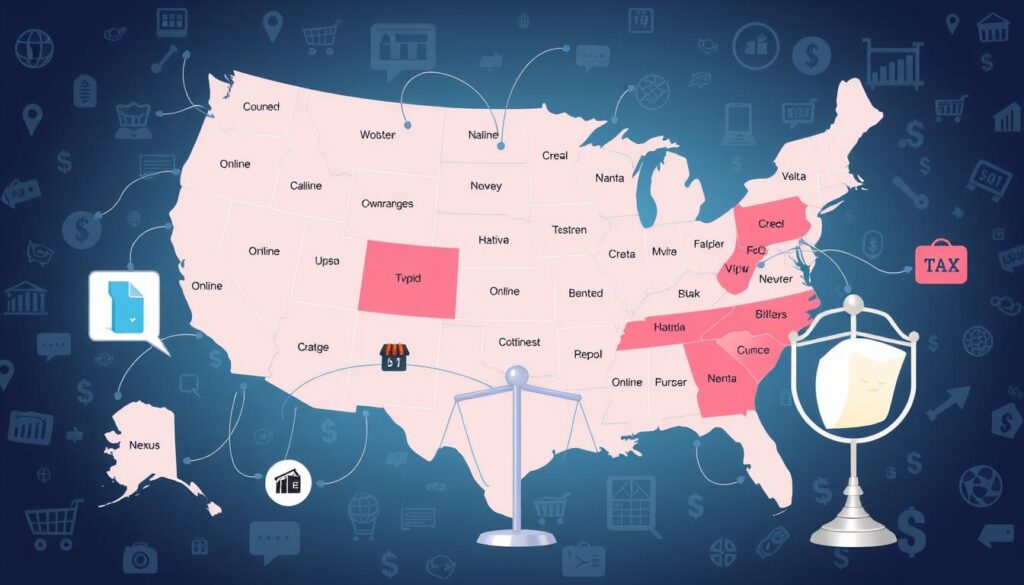
Common Sales Tax Exemptions
It’s key to know about sales tax exemptions to save money on your buys. Items may be tax-free based on who buys them or what they are. In the US, exemptions usually depend on the item, the buyer, or the item’s use12. Learning which items are tax-free can help you save, especially on must-haves.
Items Typically Exempt from Sales Tax
Things often not taxed include:
- Food
- Clothing
- Prescription medicines
- Medical devices
- Purchases by nonprofits, state, and federal agencies
- Goods supporting key industries or community benefits
Most states don’t tax specific products, letting people save on important items13. For example, Illinois stands alone in taxing prescription drugs, but only at 1%12.
Thresholds for Exemptions
Exemption thresholds are rules for when items aren’t taxed. Many states offer a break for infrequent sales based on how much you sell13. To get these tax breaks, buyers need the right paperwork, like an exemption certificate13. It’s important these claims are honest, showing the documents are true and trusted.

Companies need to keep tax exemption certificates to follow the rules and avoid mistakes when checked12. Programs like Avalara Exemption Certificate Management can help keep track of these documents easily.
Sales Tax vs. Use Tax
Consumers and businesses need to know the difference between sales tax and use tax. Sales tax is imposed on items sold and is collected by the seller. Use tax applies when items are bought out of state but used within the state. This helps local businesses compete with out-of-state sellers.
Understanding Use Tax
Use tax is for items bought without sales tax from another state. For instance, buying online from a seller who doesn’t charge sales tax might mean you owe use tax. It helps even out competition between local and remote sellers. In California, a “qualified purchaser” is someone who buys over $10,000 worth of taxable items yearly14. These purchases, used within California, should have use tax paid on them separately14.
Differences Between Sales and Use Tax
The main differences between these taxes are who pays and when. In states like California and Texas, sales tax is added to your purchase by the seller15. Use tax, however, is something buyers must report and pay on their own for untaxed purchases. This system ensures taxes are paid on all items, even those bought from another state. Not reporting use tax can result in penalties.
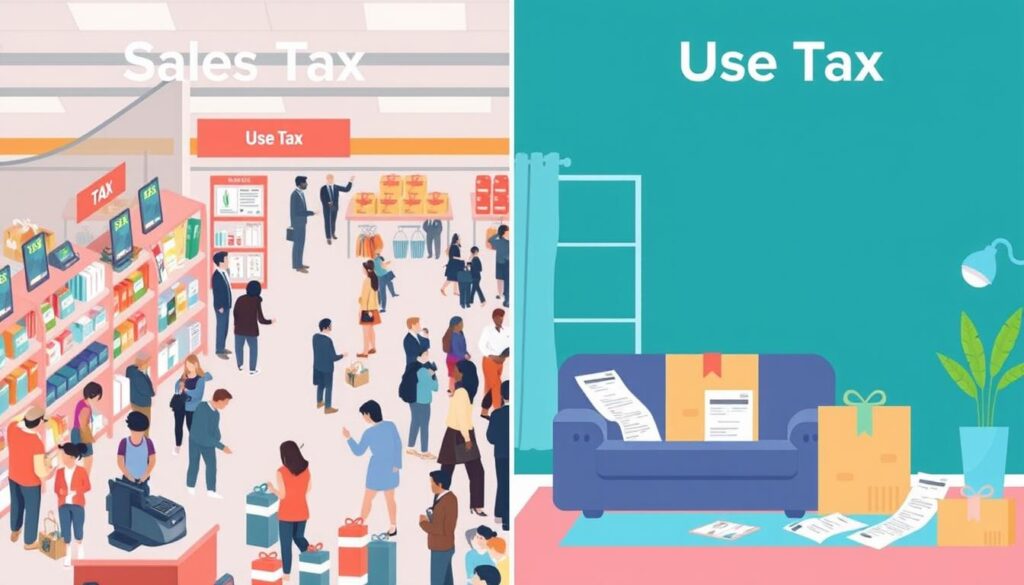
Knowing about sales and use tax can prevent financial and legal issues. Always remember your use tax duties when shopping from out of state or online. This keeps you right with state tax laws141516.
What is Excise Tax?
It’s important for buyers to understand excise tax because it affects the price of many products. An excise tax definition is a special tax on certain items like alcohol, tobacco, and fuel. This tax is usually hidden in the product’s price, which is why it’s called a “hidden tax.”
Definition and Examples of Excise Tax
Excise taxes have many purposes, often tied to government policies. For instance, fuel taxes pay for roads, while taxes on tobacco and alcohol aim to reduce their use. Some examples of excise tax are:
- Fuel tax on gasoline and diesel.
- Tobacco tax on cigarettes and other tobacco items.
- Sin tax on drinks with alcohol.
These taxes make up a small part, about 0.4%, of federal tax collections in the U.S. This shows they play a minor role compared to other taxes17.
How Excise Tax Differs from Sales Tax
The difference between sales tax vs excise tax matters a lot. Sales tax is added to the price of goods and services when bought. Excise tax, on the other hand, is often not shown on bills. For example, every state in the U.S. puts excise taxes on alcohol, tobacco, and gasoline. This shows a unified way of regulating and taxing these items18. Although sales tax is a big part of state income, excise taxes are much less significant18.
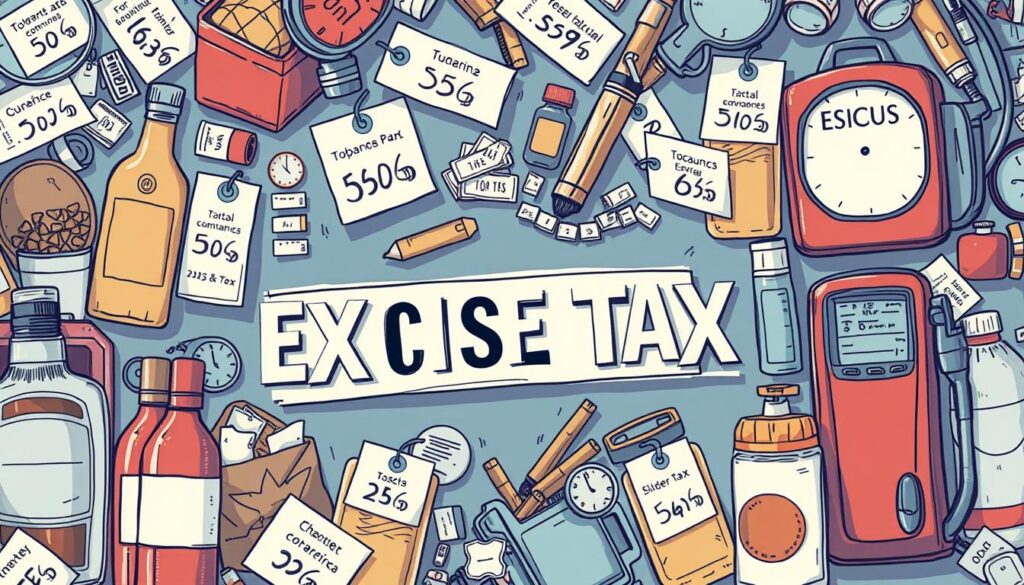
Do Tourists Pay Sales Tax in the USA?
When you visit the United States, you’ll likely have to pay sales tax on what you buy. This is the same as local residents. Each state may have different rules which can affect your shopping. Knowing these can make your trip better and help you plan your spending.
Sales Tax for Non-Residents
Most states don’t give sales tax refunds to tourists. However, Texas is an exception, where tourists can get their money back on certain buys19. To get this in Texas, you must buy at least $150 of goods from the same shop. You also need to gather receipts showing at least $12 of sales tax20. Remember, you need the original paper receipts; digital ones won’t work. Sales tax refunds are managed by the state, not the federal government. This means you can only get refunds on items you plan to take out of the country20.
Implications for Shopping While on Vacation
Understanding the sales tax for tourists is key. Every year, 79 million international visitors spend a lot in the U.S., but few get tax refunds21. In Washington, tourists might get certain taxes back if they’re buying for use outside the state. Louisiana offers a tax refund program for foreign tourists staying under 90 days. However, this will end on June 25, 202419
So, when planning your trip, think about the sales tax. This will help you avoid extra costs and enjoy your shopping more.
Examples of Sales Tax Rates in Major US States
It’s important to know sales tax rates in big states if you’re shopping or running a business. Every state has its own tax rules that impact everything from stores to hotels.
California
California’s sales tax rate is 7.25%, one of the highest in the country22. Local areas can add their taxes, sometimes making the total over 10% in some places. Cities in California may also charge extra tax on short-term stays, increasing costs for travelers.
New York
New York’s sales tax starts at 4%. With local taxes, it can go much higher22. In New York City, you might pay up to 8.875% in sales tax. This includes state and city taxes, which is important to keep in mind when shopping, especially for those visiting.
Texas
Texas has a base sales tax of 6.25%. Yet, local governments can add more23. In some places, the total sales tax rate can be close to 8.25%. This is crucial to understand for both locals and visitors, especially during big shopping events.

How Online Shopping Affects Sales Tax
Online shopping has changed how sales tax works, especially with new rules about nexus. When you buy online, it’s good to know how this affects what you pay. Whether an online store charges sales tax depends on its connection to a state. Forty-five states and DC have a statewide sales tax. Additionally, 38 states have local taxes, which can be higher than state taxes24. So, online shops may or may not charge sales tax based on state laws.
Online Purchases and Nexus
The concept of economic nexus has made sales tax more complex for online sellers. Even without a store or office, businesses might need to collect sales tax if they sell a lot in a state. This rule comes from the South Dakota v. Wayfair ruling25. If companies don’t collect sales tax, they must make sure buyers pay a use tax. Setting up systems for online sales tax is key for businesses to follow these new laws.
Changes Due to Recent Legislation
Recent laws have made understanding online sales tax more complicated. Each state has different tax laws25. For example, Louisiana’s combined sales tax rate is high at 9.6 percent. Meanwhile, Maine’s is low at 5.5 percent24. This affects not just sellers, but also buyers who might have to pay a use tax. Tools for managing indirect taxes are becoming more critical for companies. They help businesses stay in line with changing sales tax rules in online sales.

| State | Sales Tax Rate | Local Tax Rate | Combined Tax Rate |
|---|---|---|---|
| California | 7.25% | Up to 2.5% | 9.75% |
| Texas | 6.25% | Up to 2% | 8.25% |
| Louisiana | 4.45% | Up to 5.5% | 9.95% |
| Maine | 5.5% | 0% | 5.5% |
It’s important for buyers and sellers to understand these sales tax rates in online shopping. As more people shop online, it’s essential for everyone to know and follow these tax laws2425.
Conclusion
Sales tax in the U.S. is way more than just extra charges on what you buy. The rules change from state to state. This affects how much you spend, especially when you travel. For example, some local authorities are fighting online travel sites over hotel taxes. This leads to different rules in different places26, even though most services aren’t taxed27.
Understanding sales tax is very important, not just for shoppers but for everyone. Right now, there are big legal battles about taxes on online bookings. Plus, certain things you might be exempt from can change your travel costs. Knowing all this helps you make better money choices28.
Keeping up with sales tax info lets you plan your budget smarter. This way, you won’t face any surprise costs.
FAQ
What is sales tax and who pays it?
How is sales tax calculated?
Are there any states without sales tax?
What items are usually exempt from sales tax?
What is the difference between sales tax and use tax?
How do online purchases affect sales tax obligations?
Do tourists need to pay sales tax when they shop in the U.S.?
What are excise taxes, and how do they differ from sales tax?
Can sales tax rates vary within the same state?
What is meant by sales tax nexus?
Source Links
- Can US tourists get a sales tax refund when leaving the country? – TaxJar – https://www.taxjar.com/blog/08-21-can-us-tourists-get-a-sales-tax-refund
- Sales to Residents of Other Countries (Publication 104) – https://www.cdtfa.ca.gov/formspubs/pub104/
- Sales Tax Exemption – United States Department of State – https://www.state.gov/sales-tax-exemption/
- Publication 848:(2/15):A Guide to Sales Tax for Hotel and Motel Operators – https://www.tax.ny.gov/pdf/publications/sales/pub848.pdf
- U.S. sales taxes: how it works and where sales tax applies | Raymond Chabot Grant Thornton – https://www.rcgt.com/en/insights/expert-advice/changes-us-sales-taxes-how-system-works-where-sales-tax-applies/
- Origin sales tax vs. destination sales tax – Avalara – https://www.avalara.com/us/en/learn/whitepapers/origin-vs-destination-sales-tax.html
- Sales & Use Taxes and Tourist Development Tax – https://www.koontzassociates.com/sales-use-taxes-and-tourist-development-tax/
- Understanding Your Sales Tax Rules and Obligations – https://www.wolterskluwer.com/en/expert-insights/understanding-your-sales-tax-rules-and-obligations
- What is U.S. sales tax? – https://www.avalara.com/blog/en/europe/2024/02/what-is-us-sales-tax.html
- Economic nexus: How to keep up with changing sales and use tax requirements – https://tax.thomsonreuters.com/en/insights/articles/economic-nexus-how-to-keep-up-with-sales-and-use-tax-requirements
- Quick Guide to US Sales Tax Nexus – https://quaderno.io/blog/definitions-the-various-us-sales-tax-nexus/
- U.S. Sales Tax Exemptions 101 | Avalara – https://www.avalara.com/blog/en/europe/2023/06/us-sales-tax-exemptions-101.html
- Sales Tax Exemptions Exist in Every State – https://www.wolterskluwer.com/en/expert-insights/sales-tax-exemptions-exist-in-every-state
- California Use Tax, Good for You. Good for California – https://www.cdtfa.ca.gov/taxes-and-fees/use-tax/
- Use tax vs sales tax: Everything you need to know – Avalara – https://www.avalara.com/blog/en/north-america/2023/05/use-tax-sales-tax-everything-you-need-to-know.html
- Sales Tax & Use Tax – State of Nevada – https://tax.nv.gov/tax-types/sales-tax-use-tax/
- Excise tax: Overview & FAQs – https://tax.thomsonreuters.com/en/glossary/excise-tax
- PDF – https://archive.legmt.gov/content/Committees/Interim/2019-2020/Revenue/Meetings/July-2020/HJ-35/ITEP-How-Sales-and-Excise-Taxes-Work.pdf
- Eligiblity of Sales Tax Refund for Tourists in US by State – https://redbus2us.com/sales-tax-refund-for-tourists-in-us-by-state/
- How to get Tax Refund in USA as Tourist, Resident for Shopping ? FAQs – https://redbus2us.com/how-to-get-tax-refund-in-usa-as-tourist-resident-for-shopping-faqs/
- How to Get a Sales Tax Refund When Visiting the U.S. – https://www.stilt.com/taxes/tax-refund-usa/
- Which States Have the Lowest Sales Tax? – https://www.investopedia.com/articles/personal-finance/112415/5-states-without-sales-tax.asp
- State-by-state guide to lodging tax requirements – Avalara – https://www.avalara.com/mylodgetax/en/resources/state-lodging-tax-requirements.html
- Sales tax vs. use tax: the differences – https://tax.thomsonreuters.com/blog/sales-tax-vs-use-tax-the-differences/
- The Rules of Online Sales Tax | Mailchimp – https://mailchimp.com/resources/the-rules-of-sales-tax-for-todays-online-sellers/
- Taxation of Online Travel Services: Lawsuits Generally Not Succeeding In Effort to Expand Hotel Taxes – https://taxfoundation.org/research/all/federal/taxation-online-travel-services-lawsuits-generally-not-succeeding-effort-expand-hotel-taxes/
- Customs Duty Information – https://www.cbp.gov/travel/international-visitors/know-before-you-visit/customs-duty-information
- Retail Sales Tax on Accommodations | Virginia Tax – https://www.tax.virginia.gov/retail-sales-tax-accommodations
